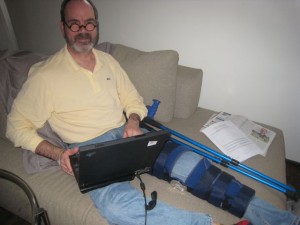Prospero’s Precepts – Thinking About Thnking

Really?
Did Shakespeare really write Shakespeare? It’s a question that’s been analyzed many times – mainly by historians and literary critics. But Peter Sturrock, a professor of physics at Stanford, recently took “A Scientific Approach to the Authorship Question.”
In his book, AKA Shakespeare, Sturrock uses probability, logic, Bayesian statistics, and good old-fashioned critical thinking to revisit the question. Sturrock argues that the real author of the Shakespearean plays could have been one of three different people. He uses a scientific, rationalist method and fashions a conversation between multiple observers, each with his own perspective.
For Shakespeare buffs, this is catnip. But even if you’re not caught up in the intrigues of the Elizabethan era, Sturrock provides a fascinating look at how to think about complex and fractured issues.
Sturrock also collects and organizes 11 key insights into critical thinking that he calls Prospero’s Precepts. These form the intellectual foundation for his inquiry into the authorship question. For me, the list itself is catnip, and worth the entire cost of the book. Here are the Precepts. I hope you enjoy them.
All beliefs in whatever realm are theories at some level. (Stephen Schneider)
Do not condemn the judgment of another because it differs from your own. You may both be wrong. (Dandemis)
Read not to contradict and confute; nor to believe and take for granted; nor to find talk and discourse; but to weigh and consider. (Francis Bacon)
Never fall in love with your hypothesis. (Peter Medawar)
It is a capital mistake to theorize before one has data. Insensibly one begins to twist facts to suit theories instead of theories to suit facts. (Arthur Conan Doyle)
A theory should not attempt to explain all the facts, because some of the facts are wrong. (Francis Crick)
The thing that doesn’t fit is the thing that is most interesting. (Richard Feynman)
To kill an error is as good a service as, and sometimes even better than, the establishing of a new truth or fact. (Charles Darwin)
It ain’t what you don’t know that gets you into trouble. It’s what you know for sure that just ain’t so. (Mark Twain)
Ignorance is preferable to error; and he is less remote from the truth who believes nothing, than he who believes what is wrong. (Thomas Jefferson)
All truth passes through three stages. First, it is ridiculed, second, it is violently opposed, and third, it is accepted as self-evident. (Arthur Schopenhauer)
By the way, I first discovered Sturrock’s book and the Precepts on Maria Popova’s excellent website, Brainpickings.
So Good, I’m Bad

One leads to the other.
I had a lot of papers to grade last week. It took me longer than I expected but I thought I did a good job of giving insightful advice and feedback. When I finished, I felt a sense of satisfaction and accomplishment. I gave myself a good pat on the back. And then, instead of seizing the moment and doing more wonderful things, … well, I ate a big bowl of ice cream.
I didn’t realize it at the time but I was engaging in moral licensing (also known as moral self-licensing or simply self-licensing). I had done something that I felt good about and, therefore, I could indulge myself in a not-so-good activity. After all, I earned it.
It’s not so bad when I eat a bowl of ice cream. I’m not hurting anyone else. Rather, I’m creating an incentive to stay focused and get the job done. I withhold the reward until the task is complete. That’s not so bad, is it?
But what if it goes farther? As Anna Merritt and her colleagues write, “Past good deeds can liberate individuals to engage in behaviors that are immoral, unethical, or otherwise problematic, behaviors that they would otherwise avoid for fear of feeling or appearing immoral.”
According to Norman Goldfarb, moral licensing works in two ways:
Moral credentials – by doing good deeds, I establish my moral bona fides. I have the credentials that prove (to me, if no one else) that I’m a moral person. A person with such credentials wouldn’t do anything immoral. So, if I do something bad, well… it must be a mistake, not a moral failure.
Moral credits – as Goldfarb puts it, “a person’s good deeds put moral dollars in a moral bank that can be withdrawn later to pay for immoral acts.”
Using credits or credentials, I can do immoral things and still conceive of myself as a moral and upstanding person. So, why not do them?
Much of the literature on moral licensing focuses on “past good deeds” that grant absolution for future not-so-good deeds. But there’s also a future dimension to licensing. I’m going to church tomorrow, so I can take advantage of someone tonight. I’m going on a diet next week, so I can pig out this week. In Goldfarb’s terminology, we can bank moral credits even before they occur. We just have to think about them.
There’s also a judgmental aspect to self-licensing. A fascinating study by Kendall Eskine at Loyola (New Orleans) suggests that eating organic foods makes you more judgmental. Research participants sampled a variety of organic and nonorganic foods. Those who sampled, “… organic foods volunteered significantly less time to help a needy stranger, and they judged moral transgressions significantly harsher than those who viewed nonorganic foods.” Doing good deeds – for ourselves or others – builds our moral credentials and can make us feel superior to those who don’t meet our same high standards. We criticize them more harshly than we otherwise would.
Doing good deeds, then, can lead to a life of immorality and hypocrisy. That’s not what I learned in Boy Scouts. Apparently, however, this is another factory-installed bias. It’s who we are. It’s baked into our DNA.
Like our other biases, the only answer is awareness. We can’t flush this behavior out of our systems. It’s in too deep. But we can be aware of it. We can apply self-awareness to self-licensing. We can take our time and think about our thinking. If we do, then perhaps moral behavior will lead to moral behavior instead of the opposite.
What Is Consciousness Good For?

My subconscious is driving the car.
Can you solve a moderately difficult arithmetic problem (say, 3 + 6 – 2 + 5) in your head? Sure, you can. You just need to think about it for a moment.
Could you do the same problem in your head if a researcher were flashing an incredibly annoying bright light in your eye? The light is so bright and flashes so quickly that it’s impossible to focus your attention. Yet, you can still solve the problem. How can that be?
The short answer is that your subconscious (aka System 1 in this website) does the work. It can process arithmetic problems or word puzzles that you’re not consciously aware of.
Professors from the Hebrew University in Jerusalem figured this out with an ingenious experiment. They presented the bright flashing light to one eye and arithmetic or word problems to the other eye. The light was so distracting that subjects didn’t realize that a problem was entering their brain. Yet, they were able to solve it just fine, without realizing that they were doing so. (Here’s the original research article; here’s a less technical summary from the BBC).
The subjects weren’t able to “think about it for a moment”. They couldn’t engage their conscious (System 2) thinking. So, how did they do it? It had to be their subconscious, or System 1.
This finding starts to challenge our long-held beliefs about the differences between our conscious and subconscious processes. We believed that certain skills – like arithmetic and word puzzles – require higher order processing. We need to engage System 2 and focus our attention. But this experiment, and many others like it, demonstrates that System 1 can do a lot more than we expected on its own. (For another example of how your brain can absorb information subconsciously, click here).
Ran Hassin, one of the authors of the flashing light study, went on to create a “Yes It Can” (YIC) model of the subconscious. Hassin asks the simple question, “Which high level cognitive functions can the unconscious perform, and which are uniquely conscious?” After reviewing numerous experiments, he argues, “…that unconscious processes can perform the same fundamental, high-level functions that conscious processes can perform.” (Click here for the article).
Let’s assume for a moment that Hassin is right – our subconscious mind can perform essentially the same functions as our conscious mind. Why, then, do we need consciousness?
Hassin points out that, “Good sprint runners can run 100 meters in less than ten seconds, but more often than not they choose not to.” Similarly, we might be able to use our subconscious for many tasks but – for one reason or another – we choose not to.
When I learned to drive, for instance, I was very conscious of the car itself, the dials on the dashboard, speed, road conditions, and so on. Today, driving is second nature to me. I can drive for miles without being consciously aware of it. It’s often called highway hypnosis.
My subconscious drives the car just fine until something out of the ordinary happens. When something novel (and perhaps dangerous) occurs, I instantly revert to conscious mode. According to Hassin’s argument, my subconscious might be able to handle the novel situation on its own. But, for one reason or another, my conscious mind can handle it better.
Perhaps the main role of consciousness, then, is to practice and master novel skills or to react to novel situations. As our skills improve, our subconscious takes over much of the task. Our conscious mind can move on to new things.
Perhaps our conscious mind continually hungers for novelty. We get bored when there is nothing new for our consciousness to work on. This could even explain the hedonic treadmill. New things engage us and make us happy. Old things fade into the (subconscious) wallpaper.
Consciousness, then, may be a fundamental force driving us toward creativity and innovation. Seen in this light, creativity is not simply a “good thing.” Rather it’s a “necessary thing.” We should pay more attention.
Placebo, Nocebo — Worried Sick.

It was the gluten.
A few months ago, I was experiencing some intestinal problems. (I’ll spare you the details). Suellen suggested that I cut back on my gluten consumption. I did and my symptoms abated.
Was it gluten? Or was it nocebo?
As I study up on happiness, I frequently run across the placebo effect. The idea is simple: if you expect a treatment to make you feel better, … well, then you’ll feel better, even if the treatment is useless. It’s the power of positive thinking.
What about the opposite? Can you think yourself into a bad mood? Well, … duh … of course you can. Our thinking affects our mood (and vice versa). But can negative thinking affect our health? Even if we don’t know we’re thinking negatively?
Welcome to nocebo. Nocebo (Latin for I will harm) is essentially the opposite of placebo (Latin for I will please). In both cases, the effects are real. Things actually do change in your body. But the treatment doesn’t cause the changes. The mind does.
The nocebo effect often pops up during pharmaceutical testing. Researchers randomly assign people to experimental and control groups. The experimental group receives the treatment. The control group receives an inert treatment, often described as sugar pills.
In the best tests — the double blind – neither the subjects nor the researchers know which person is in which group. All the procedures – except the actual treatment — are exactly the same.
The researchers read the same warnings to both groups. Typically these include warnings about side effects. In many such studies, some of the people in the control group experience the side effects they were warned about. Their minds create the nocebo effect.
The nocebo effect can disrupt important pharmaceutical studies. But it doesn’t stop there. As pointed out in several articles, (here, here, and here) we can literally worry ourselves sick. People living near wind farms may report various forms of sickness and insomnia. Mobile phone users may report headaches (and fear much worse). People near wi-fi signals may report “…headaches, nausea, exhaustion, tingling, trouble concentrating, and gastrointestinal distress, among other symptoms.”
When researchers closely study these phenomena, however, they find no link between the supposed cause and the effect. The mind is filling the gap and causing the effect. As various researchers have found, all it takes is a little gossip or a few media reports.
Can we suppress the nocebo effect by not warning people of the dangers of various modern technologies? That would certainly raise ethical questions. It may also have practical limits. We normally assume that the placebo and nocebo effects occur because we don’t know certain things. We don’t know that we’re getting an inert treatment and, therefore, our symptoms either get better (placebo) or worse (nocebo) based on our expectations. Our minds are deceiving us.
But one study found that even when people knew they were getting an inert treatment, they still got better. Titled “Placebos Without Deception”, the study told people with irritable bowel syndrome (IBS) that they would receive “placebo pills made of an inert substance, like sugar pills, that have been shown in clinical studies to produce significant improvement in IBS symptoms through mind-body self-healing processes”. The result: symptoms improved. The placebo worked, even without the benefit of deception. If placebos work without deception, might nocebos work the same way?
So, did gluten cause my intestinal distress? Hard to say. I’ve heard so much about gluten intolerance lately, that I may just have thought myself into intestinal problems. It may well be time to heed the BBC’s advice: “Beware the scaremongers. Like a witch doctor’s spell, their words might be spreading modern plagues.”
Brian Williams and Core Priorities

Values clarification.
In their book Decisive, Chip and Dan Heath write about the need to honor our core priorities when making decisions. They write that “An agonizing decision … is often a sign of a conflict among ‘core priorities’ … [T]hese are priorities that transcend the week or the quarter … [including] long-term goals and aspirations.”
To illustrate their point, the Heath brothers tell the story of Interplast*, the non-profit organization that recruits volunteer surgeons to repair cleft lips throughout the world. Interplast had some ”thorny issues” that caused contentious arguments and internal turmoil.
One seemingly minor issue was whether surgeons could take their families with them as they traveled to remote locations. The argument in favor: The surgeons were volunteering their time and vacations. It seems only fair to allow them to take their families. The argument against: The families distract the surgeon from their work and make it more difficult to train local doctors.
The argument was intense and divisive. Finally, one board member said to another, “You know, the difference between you and me is you believe the customer is the volunteer surgeon and I believe the customer is the patient.”
That simple statement led Interplast to re-examine and clarify its core priorities. Ultimately, Interplast’s executives resolved that the patient is indeed the center of their universe. Once that was clarified, the decision was no longer agonizing – surgeons should not take their families along.
I thought of Interplast as I read the coverage of Brian Williams’ situation at NBC. In much the same way as Interplast, NBC had to clarify its core priorities. The basic question is whom does NBC serve? Is it more loyal to Brian Williams or to its viewing audience?
In normal times, NBC doesn’t have to answer this question. It can support and promote its anchor while also serving its audience. In a crisis, however, NBC is forced to choose. It’s the moment of truth. Does the company support the man in whom it has invested so much? Or does it protect its credibility with the audience?
Ultimately, NBC sought to protect its credibility. I was struck by what Lester Holt said on his first evening on the air: “Now if I may on a personal note say it is an enormously difficult story to report. Brian is a member of our family, but so are you, our viewers and we will work every night to be worthy of your trust.”
Holt’s statement suggests to me that NBC’s core priority is credibility with the audience. I certainly respect that. It also struck me as being very similar to the question Interplast asked itself.
Clarifying your core priorities is never a simple task. Indeed, it may take a crisis to force the issue. But once you complete the task, everything else is simpler. As my father used to say: Decisions are easy when values are clear.
Here are links to two articles from the New York Times that report on how NBC executives reached their decisions regarding Brian Williams. (Click here and here)
*Interplast has been renamed ReSurge International. Its website is here.